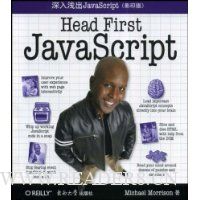基本信息·出版社:东南大学出版社 ·页码:615 页 ·出版日期:2008年08月 ·ISBN:7564112379/9787564112370 ·条形码:9787564112370 ·版本:第1版 · ...
| 商家名称 |
信用等级 |
购买信息 |
订购本书 |
|
|
 |
深入浅出JavaScript(影印版) |
 |
|
 |
深入浅出JavaScript(影印版) |
 |

基本信息·出版社:东南大学出版社
·页码:615 页
·出版日期:2008年08月
·ISBN:7564112379/9787564112370
·条形码:9787564112370
·版本:第1版
·装帧:平装
·开本:12
·正文语种:英语
内容简介 你将从本书学到什么?.
这么说你准备从写HTML和CSS的静态网页跃进到编写动态网络应用程序脚本了?这里就是起点。《深入浅出JavaScript》带你游历令人兴奋的交互式网页创建过程。为了启发你的思考,《深入浅出JavaScript》覆盖了所有的JavaScript基本知识,从基本网络编程技巧,如变量、函数和循环语句,到高级一些的专题,如表单验证、DOM操作、客户端对象、脚本程序调试——甚至Ajax!赶快做好准备快速响应的网站离你只有几页书那么远。使用JavaScript帮助人们与iRock交互
理解如何用模式匹配来验证表单数据.
使用为你定制的调试终端来调试代码
解决需要兼顾面向对象和数据驱动的博客网站困境
使用DOM操作你的网页
并在一次网上历险中追踪你所作决策的历史
为什么这本书看起来如此不同?
我们认为你的时间如此宝贵以至于不应该花费在为新概念伤脑筋上面。《深入浅出JavaScript》用最新的认知科学和学习理论打造多感官的学习体验,它运用丰富的视觉样式激发你的大脑工作,而不是密密麻麻的文字让你看了昏昏欲睡。
媒体推荐 “非常实际而且有用,同时也解释得非常清楚。本书在向一个完全新手介绍JavaScript时做得非常出色,并且本书是Head First(深入浅出)系列教学风格的又一见证。与其他关于JavaScript的书相比,用《深入浅出JavaScript》来学习是很棒的,想想其他的参考书都有电话簿那么厚。”
——Alex Lee, 学生,休斯敦大学(University of Houston)
“一个初级JavaScript开发人员的完美选择。”
——Fletcher Moore, 网络开发人员和设计者,乔治亚理工学院(Georgia Institute of Technology)
“经典‘深入浅出’系列里又一本伟大的书。”
——TW Scannell
目录 Intro xxiii
1 the interactive web: Reacting to the Virtual World 1
2 storing data: Everything Has Its Place 33
3 exploring the client: Browser Spelunking 85
4 decision making: If There’s a Fork in the Road, Take It .. 135
5 looping: At the Risk of Repeating Myself 189
6 functions: Reduce, Reuse, Recycle 243
7 forms and validation: Getting the User to Tell All 289
8 wrangling the page: Slicing and Dicing HTML with the DOM 343
9 bringing data to life: Objects as Frankendata 393
10 creating custom objects: Having It Your Way with Custom Objects 449
11 kill bugs dead: Good Scripts Gone Wrong 485
12 dynamic data: Touchy-Feely Web Applications 537
……
序言 We think of a “Head First” reader as a learner.
So what does it take to learn something? First, you have to get it, then make sure you don’t forget it. It’s not about pushing facts into your head. Based on the latest research in cognitive science, neurobiology, and educational psychology, learning takes a lot more than text on a page. We know what turns your brain on. Some of the Head First learning principles:
Make it visual. Images are far more memorable than words alone, and make learning much more effective (up to 89% improvement in recall and transfer studies). It also makes things more understandable. Put the words within or near the graphics they relate to, rather than on the bottom or on another page, and learners will be up to twice as likely to solve problems related to the content.
Use a conversational and personalized style. In recent studie s, students performed up to 40% better on post-learning tests if the content spoke directly to the reader, using a first-person, conversational style rather than taking a for mal tone. Tell stories instead of lecturing. Use casual language. Don’t take yourself too seriously. Which would you pay more attention to: a stimulating dinner par ty companion, or a lecture? ..
Get the learner to think more deeply. In other words, unless you actively flex your neurons, nothing much happens in your head. A reader has to be motivated, engaged, curious, and inspired to solve problems, draw conclusions, and generate new knowledge. And for that, you need challenges, exercises, a nd thought-provoking questions, and activities that involve both sides of the brain and multiple senses.
Get—and keep—the reader’s attention. We’ve all had the “I really want to learn this but I can’t stay awake past page one” experience. Your brain pays attention to things that are out of the ordinar y, interesting, strange, eye-catching, unexpected. Learning a new, tough, technical topic doesn’t have to be boring. Your brain will learn much more quickly if it’s not.
Touch their emotions. We now know that your ability to remember something is largely dependent on its emotional content. You remember what you care about. You remember when you feel something. No, we’re not talking heart-wrenching stories about a boy and his dog. We’re talking emotions like surprise, curiosity, fun, “what the...?” , and the feeling of “I Rule!” that comes when you solve a puzzle, learn something everybody else thinks is hard, or realize you know something that “I’m more technical than thou” Bob from engineering doesn’t.
文摘 插图:






